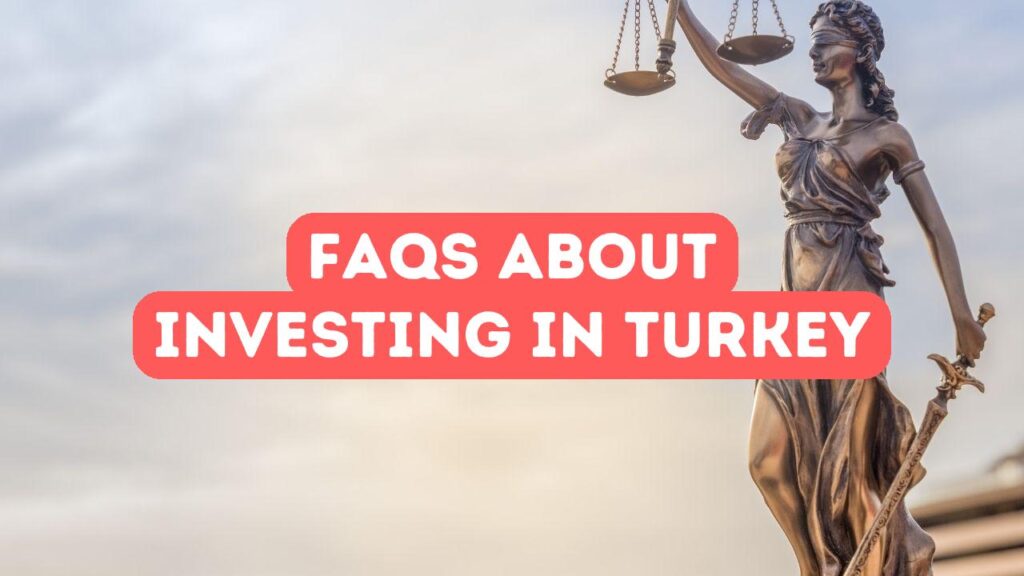Navigating the terrain of Turkish investment laws may feel like venturing into a labyrinth. With countless questions swirling in the minds of potential investors, clarity becomes crucial. How does one make sense of the FAQ on Turkish investments? What are the key Turkey investment rules that catch foreign investors off guard? In this complex world of investing in Turkey, understanding the rules can be the key to unlocking peace of mind and successful ventures. Whether you are a seasoned entrepreneur or a curious newcomer, insights into Turkish investment laws help answer foreign investment questions frequently posed by investors. From entry regulations to tax implications, these details are not just minor footnotes — they are essential components shaping your investment strategy. Dive into this guide to demystify the often misunderstood aspects of Turkey’s legal landscape for investors. Ultimately, knowledge will be your compass as you explore these investment opportunities.
Understanding the Legal Framework for Foreign Investors in Turkey
Understanding the legal framework for foreign investors in Turkey can initially seem daunting, yet it’s foundational for any successful venture. Turkey’s investment rules lay the groundwork for a structured entry, encompassing everything from business setup to operational guidelines. Recognizing these Turkey investment rules is essential, especially when addressing foreign investment questions frequently asked by new entrants. Turkish investment laws are crafted to facilitate a smooth investment journey. By familiarizing yourself with these regulations, investing in Turkey becomes less of a mystery and more of a calculated journey. The FAQ Turkish investments often highlights key topics like restricted sectors and necessary permits, ensuring you’re one step ahead. These laws aren’t just bureaucratic hurdles; they’re the very backbone that helps safeguard your business interests. A thorough comprehension of the legalities equips you with the confidence to navigate this promising market effectively.
Unraveling the complexities of Turkish investment laws requires more than just surface-level knowledge; it’s about integrating insights into actionable strategies. Imagine standing at a crossroads, where each path holds different opportunities and challenges. Here, in-depth understanding transforms uncertainties into informed decisions. The journey of investing in Turkey starts with decoding critical factors such as sector-specific restrictions and understanding tax incentives. The FAQ Turkish investments reveal the nuances in Turkey investment rules that need careful consideration. Are there sectors with more lucrative prospects or specific licenses required? These foreign investment questions frequently steer the strategic direction for investors. A vivid appreciation of Turkey’s regulatory environment empowers investors, turning potential roadblocks into stepping stones. After all, in the realm of investment, knowledge isn’t just power — it’s the roadmap that leads to success. By grasping these fundamentals, your venture in Turkey can flourish beyond expectations.
Turkey’s legal framework for investment doesn’t have to be a puzzle. Smart investors know it offers more than hurdles and risks — it provides a map for informed choices. While navigating Turkish investment laws, recognizing the impact of foreign direct investment (FDI) permits becomes crucial. The FAQ Turkish investments emphasize the nuances of such permits, which clarify what sectors one can tap into. Armed with this knowledge, businesses can strategically plan their entry into the market. Exploring the Turkey investment rules will also highlight how free zones benefit manufacturers and exporters. These insights answer foreign investment questions frequently, guiding investors to leverage Turkey’s unique offerings. Investing in Turkey, with its structured legal landscape, allows entrepreneurs to take calculated risks and seize potential rewards. Therefore, proficiency in these regulations isn’t just advisable — it’s the linchpin for a thriving investment experience in Turkey’s dynamic economy.
Key Regulations Governing Investment Opportunities in Turkey
Turkey’s investment landscape is shaped by a tapestry of regulations that cater to diverse business needs. Among the key Turkish investment laws, the Foreign Direct Investment Law stands out, ensuring equal treatment of national and international investors. This law simplifies processes and eliminates red tape, thus enhancing investor confidence. The lure of investing in Turkey is further bolstered by the Customs Union agreement, facilitating access to European markets without customs duties. Moreover, Turkey investment rules allow full repatriation of profits, adding another layer of attractiveness. For those pondering on foreign investment questions frequently, it’s important to note that Turkey has double taxation treaties with numerous countries, easing the tax burden. FAQs on Turkish investments often highlight these pivotal rules, reflecting Turkey’s commitment to maintaining a welcoming environment for investment while protecting investor rights with comprehensive legal frameworks.
When considering Turkish investment laws, understanding key regulations can enhance your investment strategy significantly. The New Turkish Commercial Code is a cornerstone, promoting transparency and fostering fair practices in the business environment. Another vital component is the Capital Markets Law, which oversees activities and transactions, ensuring orderly markets. Awareness of the Labor Law is also essential, as it details employer and employee responsibilities, contributing to stable operational frameworks for businesses. Foreign investors are further reassured by the protection standards established by international agreements, safeguarding their interests against unfair treatment. Investing in Turkey is also made easier through incentives offered in various sectors, including energy and technology, aligning with Turkey’s focus on innovation and growth. Frequently asked questions about Turkish investments often revolve around these comprehensive rules, highlighting the structured yet flexible nature of Turkey investment regulations, which cater to ambitious worldwide investors seeking a rewarding foothold in this dynamic market.
In the bustling arena of Turkish investment laws, the Foreign Direct Investment Law remains a pivotal beacon. Why? Because it paves the way for both local and global investors by equalizing the playing field. Remote but not forgotten, Turkey investment rules extend beyond just equal treatment. They include incentives that reward strategic sectors such as renewable energy and advanced manufacturing. FAQ Turkish investments material often underscores the importance of understanding sectoral restrictions, where certain fields remain exclusive to domestic players. It’s important to know, for instance, that real estate investments demand familiarity with local regulations to avoid potential pitfalls. As foreign investment questions frequently circulate, Turkey’s Investment Office offers guidance, ensuring that both seasoned and newbie investors see the forest for the trees. Ultimately, a meticulous approach and awareness of these laws aid investors in navigating the investment landscape effectively, maximizing opportunities while minimizing risks.
Navigating Compliance and Tax Implications for Foreign Investments in Turkey
Compliance with Turkish investment laws is vital for anyone considering investing in Turkey. It’s like learning the rules of a game before you play. Imagine setting foot in a new country, with Turkey investment rules guiding your every move. These rules are not just red tape; they’re your roadmap to successful investment. A common concern among investors is understanding tax implications. Did you know that tax regulations can vary significantly for different types of foreign investments? This means comprehending these policies is crucial for anyone aiming to turn a profit without unexpected setbacks. For most, foreign investment questions frequently arise, especially around how specific tax laws could impact their returns. By addressing these compliance and tax issues, potential investors can tread more confidently in this vibrant market. Understanding the intricacies of investing in Turkey will not only safeguard your venture but could transform uncertainty into opportunity.
The path of investing in Turkey is littered with questions, especially about navigating compliance. Picture it as a maze, where knowing Turkish investment laws gives you the map. Foreign investment questions frequently focus on tax and compliance issues. These matters can be daunting if left misunderstood. Imagine a garden flourishing under the right conditions; a clear grasp of Turkey investment rules and tax obligations nurtures your investment similarly. FAQ Turkish investments often spotlight these elements as crucial factors. Foreign investors must familiarize themselves with the diverse landscape of legal provisions governing investments. This familiarity is a shield against surprises, ensuring smooth sailing. Recognize the significance of tax implications; these aren’t just numbers but determinants of profitability. By mastering these, investors can clear the cloud of uncertainty, paving the way for informed decisions. Ultimately, investing wisely in Turkey means turning challenges into milestones of success.
Investing in Turkey isn’t just about capital; it’s about understanding and adapting. When foreign investment questions frequently point toward compliance and tax, it paints a dynamic picture of investment vitality. Turkish investment laws lay down Turkey investment rules, acting like the strings of a puppet—pulling in the right direction ensures fluid movement and success. Think of the tax landscape as an intricate puzzle; every piece has its place in shaping financial outcomes. FAQ Turkish investments highlight how vital it is to grasp these aspects to avoid costly missteps. Compliance is your compass, guiding you through the often-convoluted regulations, ensuring your investments are not tossed around by unexpected legal storms. Mastering these laws isn’t merely about ticking boxes; it’s about steering your investments with confidence. With proper insight, investing in Turkey becomes a journey of potential, transforming what once seemed tough into a landscape of endless opportunities.






